|
|
|
Sort Order |
|
|
|
Items / Page
|
|
|
|
|
|
|
| Srl | Item |
| 1 |
ID:
126706
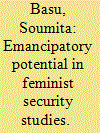

|
|
|
|
|
| Publication |
2013.
|
| Summary/Abstract |
Forum: The State of Feminist Security Studies: Continuing the Conversation. This forum comprises seven pieces conceived in response to the recent Politics & Gender Critical Perspectives section that featured contributions from Carol Cohn, Valerie Hudson, Jennifer Lobasz, Laura Sjoberg, Ann Tickner, Annick Wibben, and Lauren Wilcox (P&G 2011, Vol. 7, Issue 4). Throughout, we refer to this collection as "the CP section."
|
|
|
|
|
|
|
|
|
|
|
|
|
|
|
|
| 2 |
ID:
126707
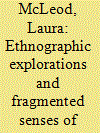

|
|
|
|
|
| Publication |
2013.
|
| Summary/Abstract |
Forum: The State of Feminist Security Studies: Continuing the Conversation. This forum comprises seven pieces conceived in response to the recent Politics & Gender Critical Perspectives section that featured contributions from Carol Cohn, Valerie Hudson, Jennifer Lobasz, Laura Sjoberg, Ann Tickner, Annick Wibben, and Lauren Wilcox (P&G 2011, Vol. 7, Issue 4). Throughout, we refer to this collection as "the CP section."
|
|
|
|
|
|
|
|
|
|
|
|
|
|
|
|
| 3 |
ID:
126702
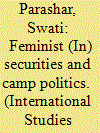

|
|
|
|
|
| Publication |
2013.
|
| Summary/Abstract |
Forum: The State of Feminist Security Studies: Continuing the Conversation. This forum comprises seven pieces conceived in response to the recent Politics & Gender Critical Perspectives section that featured contributions from Carol Cohn, Valerie Hudson, Jennifer Lobasz, Laura Sjoberg, Ann Tickner, Annick Wibben, and Lauren Wilcox (P&G 2011, Vol. 7, Issue 4). Throughout, we refer to this collection as "the CP section."
|
|
|
|
|
|
|
|
|
|
|
|
|
|
|
|
| 4 |
ID:
126696
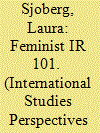

|
|
|
|
|
| Publication |
2013.
|
| Summary/Abstract |
This article discusses the pedagogical potential of a series of blog posts called "Feminist IR 101," which I wrote and posted on Duck of Minerva (duckofminerva.blogspot.com) over the course of 2010 and 2011. As our students increasingly rely on the internet as a source of not only news but knowledge and opinions, this group of posts looks to reach our student audience (and perhaps even others in the discipline) differently than textbooks or other traditional materials. They were meant to be an introduction to feminist IR in the true sense of the word-what feminist IR is, the vocabulary it uses, how it is useful in analysis, and why it is meaningful to scholars and students of gender and global politics. Their goal is to account for both what a feminist perspective contributes to the study of global politics and why I chose to do my research from that perspective. This short article looks specifically at both the "Feminist IR 101" project and its potential classroom uses, as well as the pedagogical value of blogging feminist IR more generally.
|
|
|
|
|
|
|
|
|
|
|
|
|
|
|
|
| 5 |
ID:
126712
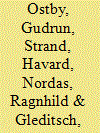

|
|
|
|
|
| Publication |
2013.
|
| Summary/Abstract |
Many studies report lower academic productivity among women. But are women less likely to get their research published in the first place? The evidence for potential gender bias in publication and impact is mixed. This article examines the gender dimension of scientific publication in international relations (IR) based on submission data for Journal of Peace Research for the period 1983-2008. It examines the gender gap in submissions and explores whether the perceived merit of a research paper is affected by the gender of the authors and reviewers. It also investigates whether the gender of the first author influences citation counts. The data show a clear but declining gender gap. They do not indicate any significant gender bias in publication success or citations.
|
|
|
|
|
|
|
|
|
|
|
|
|
|
|
|
| 6 |
ID:
126711
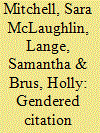

|
|
|
|
|
| Publication |
2013.
|
| Summary/Abstract |
This paper applies a methodology utilized in economics to study citation patterns in two International Studies Association journals. The paper analyzes articles published in International Studies Quarterly (ISQ) and International Studies Perspectives (ISP) in 2005. Comparisons are made based on the sex of the authors of articles and the sex of the cited authors in each paper's bibliography. Empirical analyses suggest that male authors of ISQ and ISP articles are less likely to cite work by female scholars in comparison with female authors. Mixed-gender author teams are also significantly less likely to cite research by female scholars relative to female article authors.
|
|
|
|
|
|
|
|
|
|
|
|
|
|
|
|
| 7 |
ID:
126703
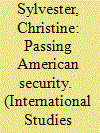

|
|
|
|
|
| Publication |
2013.
|
| Summary/Abstract |
Forum: The State of Feminist Security Studies: Continuing the Conversation. This forum comprises seven pieces conceived in response to the recent Politics & Gender Critical Perspectives section that featured contributions from Carol Cohn, Valerie Hudson, Jennifer Lobasz, Laura Sjoberg, Ann Tickner, Annick Wibben, and Lauren Wilcox (P&G 2011, Vol. 7, Issue 4). Throughout, we refer to this collection as "the CP section."
|
|
|
|
|
|
|
|
|
|
|
|
|
|
|
|
| 8 |
ID:
126705
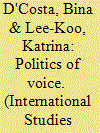

|
|
|
|
|
| Publication |
2013.
|
| Summary/Abstract |
Forum: The State of Feminist Security Studies: Continuing the Conversation. This forum comprises seven pieces conceived in response to the recent Politics & Gender Critical Perspectives section that featured contributions from Carol Cohn, Valerie Hudson, Jennifer Lobasz, Laura Sjoberg, Ann Tickner, Annick Wibben, and Lauren Wilcox (P&G 2011, Vol. 7, Issue 4). Throughout, we refer to this collection as "the CP section."
|
|
|
|
|
|
|
|
|
|
|
|
|
|
|
|
| 9 |
ID:
126698


|
|
|
|
|
| Publication |
2013.
|
| Summary/Abstract |
Critics of intercountry adoption define it as a demand-driven market for babies, from which parents in rich countries benefit at the expense of those in poor countries. Advocates hold that it often provides the best chance for orphaned children to grow up in a family. This paper investigates these opposing claims. It develops a theory that outlines the circumstances under which intercountry adoption is likely to result in a "baby trade," and evaluates expectations derived from that theory on the basis of data on adoptions to the United States. The findings suggest that sending countries with large and fast-growing adoption programs may be particularly vulnerable to the temptation to supply a demand-driven market. However, sending countries do not simply respond to international incentives. Instead, the variation in participation in intercountry adoption between sending countries is partially driven by domestic incentives. The paper ends with suggestions for future research and policy.
|
|
|
|
|
|
|
|
|
|
|
|
|
|
|
|
| 10 |
ID:
126704


|
|
|
|
|
| Publication |
2013.
|
| Summary/Abstract |
Forum: The State of Feminist Security Studies: Continuing the Conversation. This forum comprises seven pieces conceived in response to the recent Politics & Gender Critical Perspectives section that featured contributions from Carol Cohn, Valerie Hudson, Jennifer Lobasz, Laura Sjoberg, Ann Tickner, Annick Wibben, and Lauren Wilcox (P&G 2011, Vol. 7, Issue 4). Throughout, we refer to this collection as "the CP section."
|
|
|
|
|
|
|
|
|
|
|
|
|
|
|
|
| 11 |
ID:
126708


|
|
|
|
|
| Publication |
2013.
|
| Summary/Abstract |
Using personal observations and the results from a variety of studies on gender and scholarship, this paper demonstrates that our discipline often holds women's research in lower esteem. It does so by examining gendered patterns in various cultures of academic life, the processes by which intellectual leaders emerge, and coauthorship as one of the most significant social activities undertaken by researchers. Solutions at all institutional levels-professional organizations, journals, grant organizations, universities and colleges, graduate colleges, departments-are suggested. And even well-intentioned individuals, in a variety of roles-departmental leaders, panel organizers, discussants, bloggers, instructors, mentors, colleagues, authors, and journalists-must be willing to examine and change their own practices. The result is win-win: valuing women's research is better for female and male academics, students' intellectual health, the strength of colleges and universities, and the long-run vitality of professional organizations and journals.
|
|
|
|
|
|
|
|
|
|
|
|
|
|
|
|
| 12 |
ID:
126699


|
|
|
|
|
| Publication |
2013.
|
| Summary/Abstract |
This forum comprises seven pieces conceived in response to the recent Politics & Gender Critical Perspectives section, titled "The State of Feminist Security Studies: A Conversation" (P&G , Vol. 7, Issue 4). Throughout, we refer to this collection as "the CP section." We are pleased to take this opportunity to continue the conversation begun in the CP section and to offer sympathetic yet critically engaged contributions in response to the original collection of essays. We hope that this forum indicates the (geographical, cultural, theoretical) diversity of feminist security studies and its multivocality, as well as providing an overview, for those not familiar with the literature, of the issues and debates currently enlivening the field.
|
|
|
|
|
|
|
|
|
|
|
|
|
|
|
|
| 13 |
ID:
126709
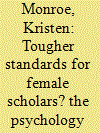

|
|
|
|
|
| Publication |
2013.
|
| Summary/Abstract |
Other articles in this symposium suggest gender bias influences both the acceptance and citation patterns of scholarly articles. This article offers several reasons why such bias exists and proposes several solutions to remedy the problem.
|
|
|
|
|
|
|
|
|
|
|
|
|
|
|
|
| 14 |
ID:
126697
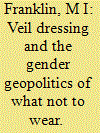

|
|
|
|
|
| Publication |
2013.
|
| Summary/Abstract |
This essay examines controversies in the European Union around legislation that bans women from dressing in a "visibly Muslim" way in public. It brings together two usually separate domains of inquiry to reconsider geopolitical, emotional, and intellectual crosscurrents of these ostensibly national controversies in parts of the EU. I argue that these two domains need addressing in tandem to generate new insights and move scholarly debates that have become polarized in turn. The first strand is critiques of the influence that popular culture, in particular reality television makeover shows, has on body image and global consumption practices. The second is postcolonial critiques of orientalist discourses around the agency of Muslim women and veil dressing practices. The aim is to unpack the underlying contradictions and blind-spots that characterize many of the arguments for and against these laws, used by critics of not only Burqa-Ban legislation but also Muslim women's veil dressing in a context in which western public imaginaries about what the veil really means are becoming increasingly polarized and punitive. This juxtaposition can provide a new theoretical and empirical point of departure for reflecting on the geopolitical and ethical implications of laws that aim to police women's bodies and ways of dressing in western liberal democracies; an hardening of attitude and political discourse that lies at the intersection of global shifts in post 9/11 popular imaginaries, national identity projects, and geopolitics.
|
|
|
|
|
|
|
|
|
|
|
|
|
|
|
|
| 15 |
ID:
126713
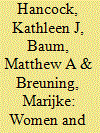

|
|
|
|
|
| Publication |
2013.
|
| Summary/Abstract |
Why are women still relatively scarce in the international studies profession? Although women have entered careers in international studies in increasing numbers, they represent increasingly smaller percentages as they move from PhD student to full professor. Our survey investigates why this is so, focusing on the assistant professor years, which are crucial to succeeding in the profession. We found that there are significant differences in publication rates, as well as differences in research focus (traditional subjects vs. newer subfields) and methodologies (quantitative vs. qualitative). Further, women and men have different perceptions of official and unwritten expectations for research, and policies regarding faculty with children may affect how successful women are in moving up the ladder. Taken together, these findings suggest reasons for the continued "leakiness" of the career pipeline for women and some potential solutions.
|
|
|
|
|
|
|
|
|
|
|
|
|
|
|
|
|
|
|
|
|